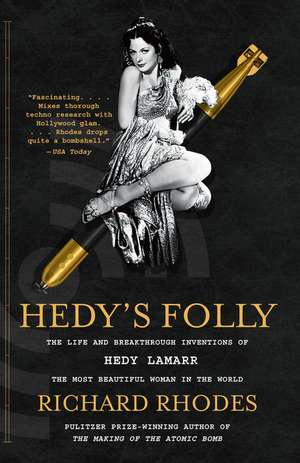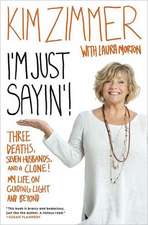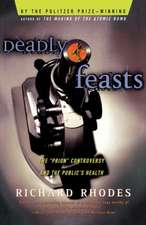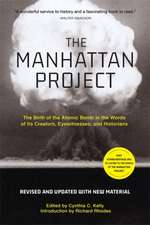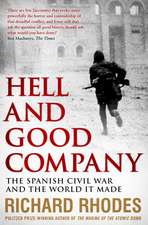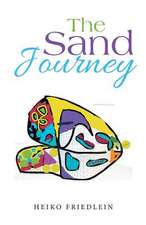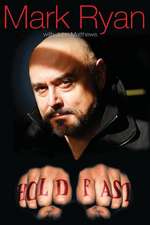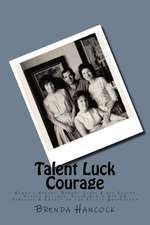Hedy's Folly
Autor Richard Rhodesen Limba Engleză Paperback – 15 aug 2012
Beginning at a Hollywood dinner table, Hedy's Folly tells a wild story of innovation that culminates in U.S. patent number 2,292,387 for a "secret communication system." Along the way Rhodes weaves together Hollywood’s golden era, the history of Vienna, 1920s Paris, weapons design, music, a tutorial on patent law and a brief treatise on transmission technology. Narrated with the rigor and charisma we've come to expect of Rhodes, it is a remarkable narrative adventure about spread-spectrum radio's genesis and unlikely amateur inventors collaborating to change the world.
Preț: 83.72 lei
Preț vechi: 100.73 lei
-17% Nou
Puncte Express: 126
Preț estimativ în valută:
16.02€ • 16.60$ • 13.37£
16.02€ • 16.60$ • 13.37£
Carte disponibilă
Livrare economică 28 februarie-07 martie
Livrare express 13-19 februarie pentru 38.19 lei
Preluare comenzi: 021 569.72.76
Specificații
ISBN-13: 9780307742957
ISBN-10: 0307742954
Pagini: 261
Ilustrații: 8 PP Black and White
Dimensiuni: 133 x 203 x 14 mm
Greutate: 0.27 kg
Editura: VINTAGE BOOKS
ISBN-10: 0307742954
Pagini: 261
Ilustrații: 8 PP Black and White
Dimensiuni: 133 x 203 x 14 mm
Greutate: 0.27 kg
Editura: VINTAGE BOOKS
Recenzii
Praise for Richard Rhodes’s Hedy’s Folly:
"Fascinating. . . . mixes thorough techno research with Hollywood glam. . . . Rhodes drops quite a bombshell."--USA Today
"A smart, strange and fascinating book."--Washington Post
"It's to Mr. Rhodes's credit that he gently makes this implausible story plausible."--New York Times
"Unveils the inquisitive brain behind the beauty.... [It] reads at turns like a romance novel, patent law primer, noir narrative and exercise in forensic psychology.” —Los Angeles Times
"Rhodes's talent is making the scientifically complex accessible to the proverbial lay reader with clarity and without dumbing down the essentials of his topics."--The New York Times Book Review
"[A] charming and remarkably seamless book."—Salon
"Fascinating . . . shows Hedy Lamarr to have been a secret weapon in more ways than one."—Newsweek
"Richard Rhodes is the perfect historian to describe the abilities of Hedy Lamarr and George Antheil as scientists and inventors."--Larry McMurtry, Harper's Magazine
"Richard Rhodes's book should be celebrated: he shows that even in the "information" age, there is a way to write about an American movie star that gives readers something new."--The New Republic
"Hedy Lamarr, glamorous Hollywood star. Hedy Lamarr, glamorous genius inventor.
That's the gist of Richard Rhodes' Hedy's Folly . . . although, of course, it's far more complicated than that. And far more fascinating."—Philadelphia Inquirer
"Hedy's Folly is a reminder that neither time nor gravity can diminish the allure of a beautiful mind."--Bloomberg Business Week
"Rhodes, who has written about everything from atomic power to sex to John James Audubon, is apparently incapable of writing a bad book and most of what he does is absolutely superior."--The Daily Beast
"A riveting narrative, propelled by the ambition and idiosyncrasies of the inventors at its core."--Science News
"[A]n unusual and worthwhile read."—Washington Times
"[C]aptivating."—Boston Globe
"A focused glimpse into one actress’ remarkable life, and the rare mix of war, patriotism and intellect that fomented her unlikely invention."—Dallas Morning News
"Rhodes...manages to capture the sheer improbability of these unlikely Edisons."—Entertainment Weekly
"Rhodes puts Lamarr’s inventive spirit into coherent context.... [His] book gives us the whole Hedy — a closet geek in peacock feathers — and makes that mix believable."— Nature
"Riveting. . . . There’s enough technical and military history here to keep Rhodes’s hard-core fan base satisfied. But the cultural history is just as interesting, and Rhodes tells both stories with a sure and supple hand."—The New York Observer
"Fascinating. . . . mixes thorough techno research with Hollywood glam. . . . Rhodes drops quite a bombshell."--USA Today
"A smart, strange and fascinating book."--Washington Post
"It's to Mr. Rhodes's credit that he gently makes this implausible story plausible."--New York Times
"Unveils the inquisitive brain behind the beauty.... [It] reads at turns like a romance novel, patent law primer, noir narrative and exercise in forensic psychology.” —Los Angeles Times
"Rhodes's talent is making the scientifically complex accessible to the proverbial lay reader with clarity and without dumbing down the essentials of his topics."--The New York Times Book Review
"[A] charming and remarkably seamless book."—Salon
"Fascinating . . . shows Hedy Lamarr to have been a secret weapon in more ways than one."—Newsweek
"Richard Rhodes is the perfect historian to describe the abilities of Hedy Lamarr and George Antheil as scientists and inventors."--Larry McMurtry, Harper's Magazine
"Richard Rhodes's book should be celebrated: he shows that even in the "information" age, there is a way to write about an American movie star that gives readers something new."--The New Republic
"Hedy Lamarr, glamorous Hollywood star. Hedy Lamarr, glamorous genius inventor.
That's the gist of Richard Rhodes' Hedy's Folly . . . although, of course, it's far more complicated than that. And far more fascinating."—Philadelphia Inquirer
"Hedy's Folly is a reminder that neither time nor gravity can diminish the allure of a beautiful mind."--Bloomberg Business Week
"Rhodes, who has written about everything from atomic power to sex to John James Audubon, is apparently incapable of writing a bad book and most of what he does is absolutely superior."--The Daily Beast
"A riveting narrative, propelled by the ambition and idiosyncrasies of the inventors at its core."--Science News
"[A]n unusual and worthwhile read."—Washington Times
"[C]aptivating."—Boston Globe
"A focused glimpse into one actress’ remarkable life, and the rare mix of war, patriotism and intellect that fomented her unlikely invention."—Dallas Morning News
"Rhodes...manages to capture the sheer improbability of these unlikely Edisons."—Entertainment Weekly
"Rhodes puts Lamarr’s inventive spirit into coherent context.... [His] book gives us the whole Hedy — a closet geek in peacock feathers — and makes that mix believable."— Nature
"Riveting. . . . There’s enough technical and military history here to keep Rhodes’s hard-core fan base satisfied. But the cultural history is just as interesting, and Rhodes tells both stories with a sure and supple hand."—The New York Observer
Notă biografică
RICHARD RHODES is most recently the author of The Twilight of the Bombs, the last volume in a quartet about nuclear history. The first, The Making of the Atomic Bomb, won the Pulitzer Prize, a National Book Award, and a National Book Critics Circle Award.
Extras
One: A Charming Austrian Girl
She was Viennese, not yet seventeen in the spring of 1931 but already a professional actress, in rehearsal for a play. Hedwig Kiesler (pronounced HAYD-vig KEES-lur)-Hedy-had won a small role in the Berlin incarnation of The Weaker Sex, which the celebrated Austrian impresario Max Reinhardt was directing. When Reinhardt restaged the play in Vienna that spring, she had single-mindedly quit the Berlin cast and followed him home. "Are you here too, Fraulein Kiesler?" he'd asked her in surprise. "Are you living with your family? All right, you can be the Americaness again." Édouard Bourdet's play was a comedy with a pair of boorish stage Americans as foils. Reinhardt had assigned the actor George Weller, Hedy's husband in the play, to teach her some American songs. "I took this as a mandate to make an American out of Hedy Kiesler," the young Bostonian recalled.
She was eager to be transformed. "Hedy had only the vaguest ideas of what the United States were," Weller discovered, "except that they were grouped around Hollywood." She idolized the California tennis star Helen Wills, "Little Miss Poker Face." Wills, focused and unexpressive on the courts, all business, was the world's number-one- ranked female tennis player, midway that year through an unbroken run of 180 victories. "Watch me look like Helen Wills," Hedy teased Weller when they rehearsed together. "Du, schau' mal, hier bin ich Kleine Poker Face." Her lively young face would grow calm, Weller remembered, "expressionless and assured, her brow would clarify, and for a moment she would really become an American woman." Commandeering the property room, Hedy and George practiced singing "Yes, Sir, That's My Baby," "Yes, We Have No Bananas," and an Austrian favorite, Al Jolson's lugubrious "Sonny Boy." It melted the matrons at matinees, many of them mothers with sons lost in the long slaughter of the Great War.
An only child, entertaining herself with her dolls, Hedy had dreamed since she was a little girl of becoming a movie star. "I had a little stage under my father's desk," she recalled, "where I would act out fairy tales. When someone would come into the room they would think my mind was really wandering. I was always talking to myself." Her tall, handsome, vigorous father, Emil, an athlete as well as a successful banker, told her stories, read her books, and took her on walks in their tree-lined neighborhood and in the great park of the Wienerwald- the Vienna Woods. Wherever they went together, he explained to her how everything worked-"from printing presses to streetcars," she said. Her father's enthusiasm for technology links her lifelong interest in invention with cherished memories of her favorite parent.
Hedy's mother was stricter, concerned that such a pretty, vivacious child would grow up spoiled unless she heard criticism as well as compliments. "She has always had everything," Trude Kiesler said. "She never had to long for anything. First there was her father who, of course, adored her, and was very proud of her. He gave her all the comforts, pretty clothes, a fine home, parties, schools, sports. He looked always for the sports for her, and music." Trude had trained as a concert pianist before motherhood intervened. In turn, she supervised Hedy's lessons on the grand piano in the Kiesler salon. "I underemphasized praise and flattery," Trude determined, "hoping in this way to balance the scales for her."
The Kieslers were assimilated Jews, Trude from Budapest, Emil from Lemberg (now known as Lviv). Hedy kept her Jewish heritage secret throughout her life; her son and daughter only learned of it after her death. In prewar Vienna it had hardly mattered. The Viennese population's mixed legacy of Slavic, Germanic, Hungarian, Italian, and Jewish traditions was one of its glories, one reason for the city's unique creative ferment in the first decades of the new century. Sigmund Freud's daughters attended the same girls' middle school that Hedy later did, and after the war Anna Freud taught there.
Vienna is an old city, with ruins dating to Roman times. The emperor Marcus Aurelius wrote his third book of Meditations on that rough Germanic frontier. Set in the broad Danube valley at the eastern terminus of the Alps, it grew across the centuries through great turmoil to become the capital of the Austro-Hungarian Empire. A wide ring boulevard supplanted its medieval wall after 1857, opening it up to its suburbs. By 1910, two million ethnically diverse Viennese, reading newspapers published in ten languages, took their leisure in sparkling coffeehouses, and the beneficence of the emperor Franz Josef had filled the city's twenty-one districts with parks, statues, and palaces. To the Viennese writer Stefan Zweig, his birthplace was "a city of a thousand attractions, a city with theatres, museums, bookstores, universities, music, a city in which each day brought new surprises."
If Vienna was old, it made itself radically modern in the years around the Great War in music, theater, and art. Austrian culture had prepared the way, Zweig believed: "Precisely because the monarchy, because Austria itself for centuries had been neither politically ambitious nor particularly successful in military actions, the native pride had turned more strongly toward a desire for artistic supremacy." Vienna was the arena of that desire. The roll call of important early-twentieth-century artists, musicians, writers, scientists, and philosophers active in the Viennese milieu is startling: the artists Gustav Klimt, Josef Hoffmann, Egon Schiele, and Oskar Kokoschka; the writers Hugo von Hofmannsthal, Arthur Schnitzler, Robert Musil, and Joseph Roth; the composers Gustav Mahler, Arnold Schoenberg, Anton von Webern, and Alban Berg. Sigmund Freud invented psychoanalysis in Vienna. Ludwig Boltzmann and Ernst Mach contributed importantly to physics there. Rudolf Carnap, Kurt Gödel, Otto Neurath, and, most famously, Ludwig Wittgenstein transformed philosophy.
"The whole city was at one," Zweig saw, in its "receptivity for all that was colorful, festive and resounding, in [its] pleasure in the theatrical, whether it was on the stage or in reality, both as theatre and as a mirror of life." For Zweig, theater was the core Viennese experience:
It was not the military, nor the political, nor the commercial, that was predominant in the life of the individual and of the masses. The first glance of the average Viennese into his morning paper was not at the events in parliament, or world affairs, but at the repertoire of the theatre, which assumed so important a role in public life as hardly was possible in any other city. For the Imperial theatre, the Burgtheater, was for the Viennese and for the Austrian more than a stage upon which actors enacted parts; it was the microcosm that mirrored the macrocosm, the brightly colored reflection in which the city saw itself. . . . The stage, instead of being merely a place of entertainment, was a spoken and plastic guide of good behavior and correct pronunciation, and a nimbus of respect encircled like a halo everything that had even the faintest connection with the Imperial theatre.
What else but theater, and by extension motion pictures, would a bright, pretty, single-minded Viennese girl choose? "I acted all the time," Hedy recalled. "I copied my mother. I copied the way she walked and the way she talked. I copied her mannerisms, her facial expression. I copied the guests who came to our house. I copied people I saw in the streets. I copied the servants. I was a little living copybook. I wrote people down on me."
Acting was in the air. In his school classes, Zweig remembered, "in keeping with the Viennese atmosphere . . . the impulse to creative production became positively epidemic. Each of us sought some talent within himself and endeavored to unfold it." Four or five of Zweig's classmates wanted to be actors. "They imitated the diction of the Imperial players, they recited and declaimed without ceasing, secretly took lessons in acting, and, during the recesses at school, distributed parts and improvised entire scenes from the classics, while the rest of us formed a curious but exacting audience."
Hedy took more direct action, as her father had taught her. "He made me understand that I must make my own decisions," she said, "mold my own character, think my own thoughts." She had met Max Reinhardt, the director and impresario, at a party in 1929, when she was fifteen, and he had seemed interested in her. "He had encouraged me by telling me to hold fast to my dream and that if I held fast it would come true."
She held fast, and it did.
After an unhappy term at a Swiss finishing school that she finessed by running away home to Vienna, she scouted a motion-picture studio, Sascha-Film, the largest in the city. To buy time for her assault, she added a zero to a school absence request her mother had signed, turning one hour into ten-two school days. "I knew that the studio employed script girls. I did not have any idea of what script girls are supposed to do, but I knew that they were on the sets all the time watching the actors work-and that was enough for me." She slipped into the studio and presented herself. "They asked me, 'Do you know how to be a script girl?' and I said, 'No. But may I try?' " Probably because she was pretty as well as brash, the script supervisor laughed and took her on.
She had that day and one more to make good. The film then in production was called Geld auf der Strasse (Money in the Streets). There was a minor part for a girl in a nightclub scene. "I applied for it and right away I got it," Hedy recalled. In this account, for an American magazine, she translates her starting salary as "five dollars a day." Then she had to tell her parents that she was dropping out of school at sixteen to become a professional actress. As she remembered the negotiation in 1938:
Well, it was not too bad. They were bewildered a little but not very surprised. They were never surprised at anything I did. And besides, I had been talking movies for so long that they were really prepared for this. My dear father finally laughed and said, "You have been an actress ever since you were a baby!" So my parents did not try to prevent me. They were willing to give me this great wish of my heart.
She recalled it differently later in life. She had persuaded the director, Georg Jacoby, to give her the part. Her parents, she wrote, "were much more difficult to persuade than [Jacoby], because it meant my dropping school. But at last they agreed. My father had never forbidden his little princess anything, and besides, he reasoned that I would soon enough quit of my own accord and go back to school."
When Geld auf der Strasse wrapped, a better role followed as a secretary in Sturm im Wasserglas (Storm in a Water Glass), another Jacoby project. Then Reinhardt cast her in The Weaker Sex. "Reinhardt made me read, meet people, attend plays." She followed him back to Vienna when he restaged the play there. "Yes, we have no bananas."
"When you dance with her," George Weller remembered, "as I did every night for about three months, she is a trifle stiff to the touch. Reedlike, that's what Hedy Kiesler is, sweet and reedlike, and when she wants to talk to you she doesn't lean over your shoulder and arch herself out behind like a debutante. . . . She leans back from you [and] takes a good look in your eyes and a firm grip on your name before she will allow herself to say a word."
Weller was present when Reinhardt gave Hedy her lifelong byname, a christening later claimed by the Hollywood studio head Louis B. Mayer:
It was at the rehearsal of a cafe scene in a comedy, and the Regisseur [that is, the director] was Reinhardt. There were Viennese newspapermen watching. Suddenly the Herr Professor, a man not given to superlatives, turned to the reporters and mildly pronounced these words: "Hedy Kiesler is the most beautiful girl in the world." Instantly the reporters put it down. In five minutes the Herr Professor's sentence, utter and absolute, had been telephoned to the newspapers of the [city center], to be dispatched by press services to other newspapers, other capitals, countries, continents.
The Weaker Sex played in Vienna for one month, from 8 May to 8 June 1931. "Almost before we knew it," Weller recalled, "another play was in rehearsal." Hollywood was buying up European actors as it rapidly expanded film production, a trend that would accelerate after 1933 when the Nazis took power in Germany and then in Austria, and Jews saw their civil rights stripped away. The play, Film und Liebe (Film and Love), satirized the earlier, commercial phase of the exodus. Weller won the role of "a brash Hollywood director who thought . . . that Central European talent could be seduced by American gold into immigrating to California." The female lead as Weller remembered it called for a character "who simply recoiled at the sight of a Hollywood contract," which would have been a stretch for Hedy. In any case the director offered her a smaller role.
She rejected it. "I've never been satisfied," she explained. "I've no sooner done one thing than I am seething inside me to do another thing. And so, almost as soon as I was inside a studio I wanted to be acting in a studio. And as soon as I was acting in a studio, I wanted to be starring in a studio. I wanted to be famous." Her stage roles had been limited and her reviews mixed. Weller thought she simply "decided for herself . . . that she wanted no more stage."
Berlin was the center of filmmaking, and to Berlin she returned that August 1931, looking for work. She found it with the Russian émigré director Alexis Granowsky, who cast her as the mayor's daughter in a comedy, Die Koffer des Herrn O.F. (The Trunks of Mr. O.F.). The cast included her rising Austrian contemporary Peter Lorre in his fourth film role. When Trunks wrapped, in mid-October, Sascha-Film obligingly offered her the female lead in another comedy to be shot in Berlin, Man braucht kein Geld (One Needs No Money), opposite Heinz Rühmann, a German film star. Hedy turned seventeen midway through the November production. Die Koffer des Herrn O.F. premiered in Berlin on 2 December. Man braucht kein Geld followed in Vienna on 22 December. "Excellent work by a cast of familiar German actors," the New York Times would praise Man braucht kein Geld on its New York opening the following fall, "reinforced by Hedy Kiesler, a charming Austrian girl." It was her first American notice.
Then a truly starring role came to hand. The Czech director Gustav Machat_ found Hedy in Berlin and offered her the lead in a Czechoslovakian film, Ekstase (Ecstasy), a love story. She was thrilled. "When I had this opportunity to star in [the film]," she recalled, "it was the biggest opportunity I had had. I was mad for this chance, of course."
Shooting was scheduled for July 1932. To fill the intervening months, she replaced one of the four actors in Noël Coward's comedy Private Lives at the Komödie Theatre.
Whether or not Hedy's parents read the script of Ekstase isn't clear from the remaining record. Since she was still a minor, however, they did try to protect her:
I could not go, my father said, unless my mother went too. But I did not want my mother to go. . . . I was young enough to want to be on my own. What kind of a baby, what kind of an amateur would they think me, I said, if I had to have my mother along to take care of me! Besides, I felt embarrassed when my mother was in the studio, was on the sets watching me. I felt stiff and self-conscious then. I could not feel free and grownup like that. I finally prevailed upon my father to allow me to go with the members of the company. There could be no harm in this.
Eventually, she revealed another reason she had insisted on traveling unaccompanied: "I went to Prague because I was in love with somebody." She wanted no chaperoning mother to interfere.
From the Hardcover edition.
She was Viennese, not yet seventeen in the spring of 1931 but already a professional actress, in rehearsal for a play. Hedwig Kiesler (pronounced HAYD-vig KEES-lur)-Hedy-had won a small role in the Berlin incarnation of The Weaker Sex, which the celebrated Austrian impresario Max Reinhardt was directing. When Reinhardt restaged the play in Vienna that spring, she had single-mindedly quit the Berlin cast and followed him home. "Are you here too, Fraulein Kiesler?" he'd asked her in surprise. "Are you living with your family? All right, you can be the Americaness again." Édouard Bourdet's play was a comedy with a pair of boorish stage Americans as foils. Reinhardt had assigned the actor George Weller, Hedy's husband in the play, to teach her some American songs. "I took this as a mandate to make an American out of Hedy Kiesler," the young Bostonian recalled.
She was eager to be transformed. "Hedy had only the vaguest ideas of what the United States were," Weller discovered, "except that they were grouped around Hollywood." She idolized the California tennis star Helen Wills, "Little Miss Poker Face." Wills, focused and unexpressive on the courts, all business, was the world's number-one- ranked female tennis player, midway that year through an unbroken run of 180 victories. "Watch me look like Helen Wills," Hedy teased Weller when they rehearsed together. "Du, schau' mal, hier bin ich Kleine Poker Face." Her lively young face would grow calm, Weller remembered, "expressionless and assured, her brow would clarify, and for a moment she would really become an American woman." Commandeering the property room, Hedy and George practiced singing "Yes, Sir, That's My Baby," "Yes, We Have No Bananas," and an Austrian favorite, Al Jolson's lugubrious "Sonny Boy." It melted the matrons at matinees, many of them mothers with sons lost in the long slaughter of the Great War.
An only child, entertaining herself with her dolls, Hedy had dreamed since she was a little girl of becoming a movie star. "I had a little stage under my father's desk," she recalled, "where I would act out fairy tales. When someone would come into the room they would think my mind was really wandering. I was always talking to myself." Her tall, handsome, vigorous father, Emil, an athlete as well as a successful banker, told her stories, read her books, and took her on walks in their tree-lined neighborhood and in the great park of the Wienerwald- the Vienna Woods. Wherever they went together, he explained to her how everything worked-"from printing presses to streetcars," she said. Her father's enthusiasm for technology links her lifelong interest in invention with cherished memories of her favorite parent.
Hedy's mother was stricter, concerned that such a pretty, vivacious child would grow up spoiled unless she heard criticism as well as compliments. "She has always had everything," Trude Kiesler said. "She never had to long for anything. First there was her father who, of course, adored her, and was very proud of her. He gave her all the comforts, pretty clothes, a fine home, parties, schools, sports. He looked always for the sports for her, and music." Trude had trained as a concert pianist before motherhood intervened. In turn, she supervised Hedy's lessons on the grand piano in the Kiesler salon. "I underemphasized praise and flattery," Trude determined, "hoping in this way to balance the scales for her."
The Kieslers were assimilated Jews, Trude from Budapest, Emil from Lemberg (now known as Lviv). Hedy kept her Jewish heritage secret throughout her life; her son and daughter only learned of it after her death. In prewar Vienna it had hardly mattered. The Viennese population's mixed legacy of Slavic, Germanic, Hungarian, Italian, and Jewish traditions was one of its glories, one reason for the city's unique creative ferment in the first decades of the new century. Sigmund Freud's daughters attended the same girls' middle school that Hedy later did, and after the war Anna Freud taught there.
Vienna is an old city, with ruins dating to Roman times. The emperor Marcus Aurelius wrote his third book of Meditations on that rough Germanic frontier. Set in the broad Danube valley at the eastern terminus of the Alps, it grew across the centuries through great turmoil to become the capital of the Austro-Hungarian Empire. A wide ring boulevard supplanted its medieval wall after 1857, opening it up to its suburbs. By 1910, two million ethnically diverse Viennese, reading newspapers published in ten languages, took their leisure in sparkling coffeehouses, and the beneficence of the emperor Franz Josef had filled the city's twenty-one districts with parks, statues, and palaces. To the Viennese writer Stefan Zweig, his birthplace was "a city of a thousand attractions, a city with theatres, museums, bookstores, universities, music, a city in which each day brought new surprises."
If Vienna was old, it made itself radically modern in the years around the Great War in music, theater, and art. Austrian culture had prepared the way, Zweig believed: "Precisely because the monarchy, because Austria itself for centuries had been neither politically ambitious nor particularly successful in military actions, the native pride had turned more strongly toward a desire for artistic supremacy." Vienna was the arena of that desire. The roll call of important early-twentieth-century artists, musicians, writers, scientists, and philosophers active in the Viennese milieu is startling: the artists Gustav Klimt, Josef Hoffmann, Egon Schiele, and Oskar Kokoschka; the writers Hugo von Hofmannsthal, Arthur Schnitzler, Robert Musil, and Joseph Roth; the composers Gustav Mahler, Arnold Schoenberg, Anton von Webern, and Alban Berg. Sigmund Freud invented psychoanalysis in Vienna. Ludwig Boltzmann and Ernst Mach contributed importantly to physics there. Rudolf Carnap, Kurt Gödel, Otto Neurath, and, most famously, Ludwig Wittgenstein transformed philosophy.
"The whole city was at one," Zweig saw, in its "receptivity for all that was colorful, festive and resounding, in [its] pleasure in the theatrical, whether it was on the stage or in reality, both as theatre and as a mirror of life." For Zweig, theater was the core Viennese experience:
It was not the military, nor the political, nor the commercial, that was predominant in the life of the individual and of the masses. The first glance of the average Viennese into his morning paper was not at the events in parliament, or world affairs, but at the repertoire of the theatre, which assumed so important a role in public life as hardly was possible in any other city. For the Imperial theatre, the Burgtheater, was for the Viennese and for the Austrian more than a stage upon which actors enacted parts; it was the microcosm that mirrored the macrocosm, the brightly colored reflection in which the city saw itself. . . . The stage, instead of being merely a place of entertainment, was a spoken and plastic guide of good behavior and correct pronunciation, and a nimbus of respect encircled like a halo everything that had even the faintest connection with the Imperial theatre.
What else but theater, and by extension motion pictures, would a bright, pretty, single-minded Viennese girl choose? "I acted all the time," Hedy recalled. "I copied my mother. I copied the way she walked and the way she talked. I copied her mannerisms, her facial expression. I copied the guests who came to our house. I copied people I saw in the streets. I copied the servants. I was a little living copybook. I wrote people down on me."
Acting was in the air. In his school classes, Zweig remembered, "in keeping with the Viennese atmosphere . . . the impulse to creative production became positively epidemic. Each of us sought some talent within himself and endeavored to unfold it." Four or five of Zweig's classmates wanted to be actors. "They imitated the diction of the Imperial players, they recited and declaimed without ceasing, secretly took lessons in acting, and, during the recesses at school, distributed parts and improvised entire scenes from the classics, while the rest of us formed a curious but exacting audience."
Hedy took more direct action, as her father had taught her. "He made me understand that I must make my own decisions," she said, "mold my own character, think my own thoughts." She had met Max Reinhardt, the director and impresario, at a party in 1929, when she was fifteen, and he had seemed interested in her. "He had encouraged me by telling me to hold fast to my dream and that if I held fast it would come true."
She held fast, and it did.
After an unhappy term at a Swiss finishing school that she finessed by running away home to Vienna, she scouted a motion-picture studio, Sascha-Film, the largest in the city. To buy time for her assault, she added a zero to a school absence request her mother had signed, turning one hour into ten-two school days. "I knew that the studio employed script girls. I did not have any idea of what script girls are supposed to do, but I knew that they were on the sets all the time watching the actors work-and that was enough for me." She slipped into the studio and presented herself. "They asked me, 'Do you know how to be a script girl?' and I said, 'No. But may I try?' " Probably because she was pretty as well as brash, the script supervisor laughed and took her on.
She had that day and one more to make good. The film then in production was called Geld auf der Strasse (Money in the Streets). There was a minor part for a girl in a nightclub scene. "I applied for it and right away I got it," Hedy recalled. In this account, for an American magazine, she translates her starting salary as "five dollars a day." Then she had to tell her parents that she was dropping out of school at sixteen to become a professional actress. As she remembered the negotiation in 1938:
Well, it was not too bad. They were bewildered a little but not very surprised. They were never surprised at anything I did. And besides, I had been talking movies for so long that they were really prepared for this. My dear father finally laughed and said, "You have been an actress ever since you were a baby!" So my parents did not try to prevent me. They were willing to give me this great wish of my heart.
She recalled it differently later in life. She had persuaded the director, Georg Jacoby, to give her the part. Her parents, she wrote, "were much more difficult to persuade than [Jacoby], because it meant my dropping school. But at last they agreed. My father had never forbidden his little princess anything, and besides, he reasoned that I would soon enough quit of my own accord and go back to school."
When Geld auf der Strasse wrapped, a better role followed as a secretary in Sturm im Wasserglas (Storm in a Water Glass), another Jacoby project. Then Reinhardt cast her in The Weaker Sex. "Reinhardt made me read, meet people, attend plays." She followed him back to Vienna when he restaged the play there. "Yes, we have no bananas."
"When you dance with her," George Weller remembered, "as I did every night for about three months, she is a trifle stiff to the touch. Reedlike, that's what Hedy Kiesler is, sweet and reedlike, and when she wants to talk to you she doesn't lean over your shoulder and arch herself out behind like a debutante. . . . She leans back from you [and] takes a good look in your eyes and a firm grip on your name before she will allow herself to say a word."
Weller was present when Reinhardt gave Hedy her lifelong byname, a christening later claimed by the Hollywood studio head Louis B. Mayer:
It was at the rehearsal of a cafe scene in a comedy, and the Regisseur [that is, the director] was Reinhardt. There were Viennese newspapermen watching. Suddenly the Herr Professor, a man not given to superlatives, turned to the reporters and mildly pronounced these words: "Hedy Kiesler is the most beautiful girl in the world." Instantly the reporters put it down. In five minutes the Herr Professor's sentence, utter and absolute, had been telephoned to the newspapers of the [city center], to be dispatched by press services to other newspapers, other capitals, countries, continents.
The Weaker Sex played in Vienna for one month, from 8 May to 8 June 1931. "Almost before we knew it," Weller recalled, "another play was in rehearsal." Hollywood was buying up European actors as it rapidly expanded film production, a trend that would accelerate after 1933 when the Nazis took power in Germany and then in Austria, and Jews saw their civil rights stripped away. The play, Film und Liebe (Film and Love), satirized the earlier, commercial phase of the exodus. Weller won the role of "a brash Hollywood director who thought . . . that Central European talent could be seduced by American gold into immigrating to California." The female lead as Weller remembered it called for a character "who simply recoiled at the sight of a Hollywood contract," which would have been a stretch for Hedy. In any case the director offered her a smaller role.
She rejected it. "I've never been satisfied," she explained. "I've no sooner done one thing than I am seething inside me to do another thing. And so, almost as soon as I was inside a studio I wanted to be acting in a studio. And as soon as I was acting in a studio, I wanted to be starring in a studio. I wanted to be famous." Her stage roles had been limited and her reviews mixed. Weller thought she simply "decided for herself . . . that she wanted no more stage."
Berlin was the center of filmmaking, and to Berlin she returned that August 1931, looking for work. She found it with the Russian émigré director Alexis Granowsky, who cast her as the mayor's daughter in a comedy, Die Koffer des Herrn O.F. (The Trunks of Mr. O.F.). The cast included her rising Austrian contemporary Peter Lorre in his fourth film role. When Trunks wrapped, in mid-October, Sascha-Film obligingly offered her the female lead in another comedy to be shot in Berlin, Man braucht kein Geld (One Needs No Money), opposite Heinz Rühmann, a German film star. Hedy turned seventeen midway through the November production. Die Koffer des Herrn O.F. premiered in Berlin on 2 December. Man braucht kein Geld followed in Vienna on 22 December. "Excellent work by a cast of familiar German actors," the New York Times would praise Man braucht kein Geld on its New York opening the following fall, "reinforced by Hedy Kiesler, a charming Austrian girl." It was her first American notice.
Then a truly starring role came to hand. The Czech director Gustav Machat_ found Hedy in Berlin and offered her the lead in a Czechoslovakian film, Ekstase (Ecstasy), a love story. She was thrilled. "When I had this opportunity to star in [the film]," she recalled, "it was the biggest opportunity I had had. I was mad for this chance, of course."
Shooting was scheduled for July 1932. To fill the intervening months, she replaced one of the four actors in Noël Coward's comedy Private Lives at the Komödie Theatre.
Whether or not Hedy's parents read the script of Ekstase isn't clear from the remaining record. Since she was still a minor, however, they did try to protect her:
I could not go, my father said, unless my mother went too. But I did not want my mother to go. . . . I was young enough to want to be on my own. What kind of a baby, what kind of an amateur would they think me, I said, if I had to have my mother along to take care of me! Besides, I felt embarrassed when my mother was in the studio, was on the sets watching me. I felt stiff and self-conscious then. I could not feel free and grownup like that. I finally prevailed upon my father to allow me to go with the members of the company. There could be no harm in this.
Eventually, she revealed another reason she had insisted on traveling unaccompanied: "I went to Prague because I was in love with somebody." She wanted no chaperoning mother to interfere.
From the Hardcover edition.
Descriere
What do Hedy Lamarr, avant-garde composer George Antheil, and a cell phone have in common? The answer is spread-spectrum radio: a revolutionary invention based on the switching of communications signals among different frequencies. Only a writer of Rhodes's caliber could do justice to this remarkable story.
